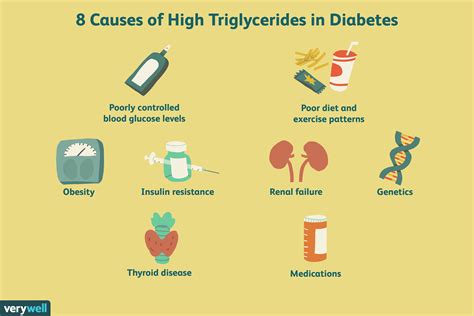Intro
Discover what causes high triglycerides, including diet, genetics, and lifestyle factors, and learn how to manage and lower triglyceride levels naturally with healthy habits and supplements.
High triglycerides, also known as hypertriglyceridemia, is a common condition where the level of triglycerides in the blood exceeds the normal range. Triglycerides are a type of fat found in the blood, and they are an important source of energy for the body. However, when triglyceride levels become too high, it can increase the risk of heart disease, stroke, and other health problems. In this article, we will explore the causes of high triglycerides and what can be done to manage and prevent this condition.
The importance of understanding high triglycerides cannot be overstated. High triglycerides can lead to the development of fatty liver disease, pancreatitis, and other health problems. Moreover, high triglycerides can also increase the risk of heart disease, which is one of the leading causes of death worldwide. Therefore, it is essential to understand the causes of high triglycerides and take steps to manage and prevent this condition.
High triglycerides can be caused by a combination of genetic, dietary, and lifestyle factors. Some of the common causes of high triglycerides include a diet high in saturated and trans fats, obesity, physical inactivity, and certain medical conditions such as diabetes and hypothyroidism. Additionally, certain medications such as beta-blockers and corticosteroids can also increase triglyceride levels. In some cases, high triglycerides can also be caused by genetic disorders such as familial hypertriglyceridemia.
Causes of High Triglycerides

There are several causes of high triglycerides, including dietary factors, lifestyle factors, and medical conditions. A diet high in saturated and trans fats can increase triglyceride levels, as can a diet high in refined carbohydrates and added sugars. Additionally, physical inactivity and obesity can also contribute to high triglycerides. Certain medical conditions such as diabetes, hypothyroidism, and kidney disease can also increase triglyceride levels. Furthermore, certain medications such as beta-blockers and corticosteroids can also increase triglyceride levels.
Dietary Factors
Dietary factors play a significant role in the development of high triglycerides. A diet high in saturated and trans fats can increase triglyceride levels, as can a diet high in refined carbohydrates and added sugars. Foods that are high in saturated and trans fats include red meat, full-fat dairy products, and processed snacks. Refined carbohydrates and added sugars can be found in foods such as white bread, sugary drinks, and baked goods.Effects of High Triglycerides

High triglycerides can have serious effects on the body. When triglyceride levels become too high, it can increase the risk of heart disease, stroke, and other health problems. High triglycerides can also lead to the development of fatty liver disease, pancreatitis, and other health problems. Additionally, high triglycerides can also increase the risk of kidney disease and certain types of cancer.
Heart Disease
High triglycerides can increase the risk of heart disease, which is one of the leading causes of death worldwide. When triglyceride levels become too high, it can cause the buildup of plaque in the arteries, which can lead to heart attacks and strokes. Additionally, high triglycerides can also increase the risk of high blood pressure, which can further increase the risk of heart disease.Managing High Triglycerides

Managing high triglycerides requires a combination of dietary changes, lifestyle modifications, and medical treatment. Dietary changes include reducing the intake of saturated and trans fats, refined carbohydrates, and added sugars. Lifestyle modifications include increasing physical activity, losing weight, and quitting smoking. Medical treatment may include medications such as fibrates and omega-3 fatty acids, which can help lower triglyceride levels.
Dietary Changes
Dietary changes are essential for managing high triglycerides. A healthy diet that is low in saturated and trans fats, refined carbohydrates, and added sugars can help lower triglyceride levels. Foods that are high in fiber, protein, and healthy fats such as avocados, nuts, and olive oil can help lower triglyceride levels. Additionally, increasing the intake of omega-3 fatty acids, which can be found in fatty fish, flaxseeds, and walnuts, can also help lower triglyceride levels.Treatment Options

There are several treatment options available for high triglycerides. Medications such as fibrates and omega-3 fatty acids can help lower triglyceride levels. Additionally, lifestyle modifications such as increasing physical activity, losing weight, and quitting smoking can also help lower triglyceride levels. In some cases, surgery may be necessary to treat underlying medical conditions that are contributing to high triglycerides.
Medications
Medications such as fibrates and omega-3 fatty acids can help lower triglyceride levels. Fibrates work by reducing the production of triglycerides in the liver and increasing the removal of triglycerides from the bloodstream. Omega-3 fatty acids work by reducing inflammation and improving the breakdown of triglycerides.Prevention

Preventing high triglycerides requires a combination of dietary changes, lifestyle modifications, and regular health checkups. A healthy diet that is low in saturated and trans fats, refined carbohydrates, and added sugars can help prevent high triglycerides. Lifestyle modifications such as increasing physical activity, losing weight, and quitting smoking can also help prevent high triglycerides. Regular health checkups can help identify underlying medical conditions that may be contributing to high triglycerides.
Regular Health Checkups
Regular health checkups are essential for preventing high triglycerides. Health checkups can help identify underlying medical conditions that may be contributing to high triglycerides. Additionally, health checkups can help monitor triglyceride levels and identify any changes that may indicate an increased risk of heart disease or other health problems.Conclusion and Next Steps

In conclusion, high triglycerides are a common condition that can increase the risk of heart disease, stroke, and other health problems. Managing high triglycerides requires a combination of dietary changes, lifestyle modifications, and medical treatment. Preventing high triglycerides requires a healthy diet, regular physical activity, and regular health checkups. By understanding the causes of high triglycerides and taking steps to manage and prevent this condition, individuals can reduce their risk of heart disease and other health problems.
We hope this article has provided you with a comprehensive understanding of high triglycerides and what can be done to manage and prevent this condition. If you have any questions or concerns, please do not hesitate to comment below. Additionally, if you found this article helpful, please share it with your friends and family to help spread awareness about the importance of managing high triglycerides.
What are triglycerides?
+Triglycerides are a type of fat found in the blood that serves as an important source of energy for the body.
What causes high triglycerides?
+High triglycerides can be caused by a combination of genetic, dietary, and lifestyle factors, including a diet high in saturated and trans fats, obesity, physical inactivity, and certain medical conditions.
How can high triglycerides be managed?
+Managing high triglycerides requires a combination of dietary changes, lifestyle modifications, and medical treatment, including reducing the intake of saturated and trans fats, increasing physical activity, and taking medications such as fibrates and omega-3 fatty acids.
Can high triglycerides be prevented?
+Yes, high triglycerides can be prevented by maintaining a healthy diet, engaging in regular physical activity, and getting regular health checkups to identify and manage underlying medical conditions that may be contributing to high triglycerides.
What are the risks of high triglycerides?
+High triglycerides can increase the risk of heart disease, stroke, and other health problems, including fatty liver disease, pancreatitis, and kidney disease.
